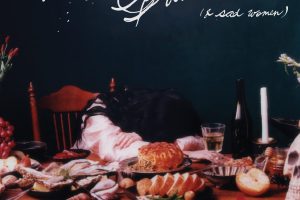Prelude to Ecstasy
The Last Dinner Party (Island, 2024)
London-based indie/baroque rock band The Last Dinner Party makes an impressive debut with Prelude to Ecstasy, their first studio album. This all-femme quintet built up suspense in the lead-up to its release, opening for giants such as Hozier and The Rolling Stones before releasing a single record. Prelude to Ecstasy is worth the wait.
It’s a decidedly Gen-Z project anchored to a lineage of boundary-pushing voices such as Kate Bush, Florence Welch, and even David Bowie. It is rich with religious—particularly Catholic—imagery that explores love, sexuality, power, patriarchy, and longing for freedom, often with queer undertones. “Sinner” mourns a past “when touch was innocent . . . Before it felt like a sin.” “My Lady of Mercy,” as well as the album title itself, evokes saintly (and more than a little erotic) ecstasies: “Oh, rest your feet on me / My lady of mercy / Strike me, pierce me straight through the heart.”
Such references, coupled with lush instrumentals, give the album a medieval, even churchy feel, with plenty of campy debauchery to match. But the band reveals a baseline skepticism not only with religion but with humanity itself and a desire to speak the truth, no matter how painful. Everything has a cost: “Let me make my grief a commodity,” vocalist Abigail Morris sings in “Burn Alive.”
It is easy to understand the disillusionment within Gen Z. They have never known a world before the “War on Terror,” a church before the sex abuse scandal, a planet not in visible crisis. Of course they sing of desperation, loss, and the sneaking suspicion that—as their single suggests—“Nothing Matters.”
And yet the beauty—even fun—within these tracks is a testament to the unshakeable dignity of The Last Dinner Party and their Gen Z peers. Faith and hope may be elusive, but love remains something to sing about.
This article also appears in the May 2024 issue of U.S. Catholic (Vol. 89, No. 5, page 38). Click here to subscribe to the magazine.
Image: The Last Dinner Party
















Add comment